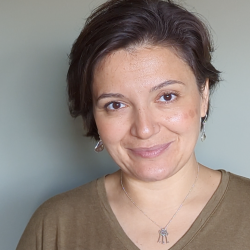
Priya Sharp
Academic and research departments
Faculty of Health and Medical Sciences, School of Veterinary Medicine.About
Biography
Priya graduated from the University of Liverpool School of Veterinary Science in 2009 and worked in companion animal practice until joining the University of Surrey in 2017.
Here she began her academic career as a fixed-term surgical teaching associate, working with students in the live animal neutering clinic to help prepare them for some of the skills required for a day-one competent veterinarian. Later that same year, Priya took on a permanent role as a Veterinary Clinical Teaching Fellow to help construct the final year curriculum ahead of the university’s first cohort entering their intra-mural rotations. A new role to support the development of veterinary clinical skills was created in 2019, and Priya was fortunate to be appointed Teaching Fellow in Veterinary Clinical Skills.
Priya believes students should be encouraged to practice their clinical skills on part-task trainers, models and simulations ahead of performing them on animals for the first time. This allows students to become familiar with the skills, learn the individual steps and reduce conscious effort of preparing themselves to perform the skill on the live patient. It also reduces student anxiety around potentially harming animals before they are truly familiar with the skills.
Priya still works in this same role today, as Senior Lecturer in Veterinary Clinical Skills, and coordinates the clinical skills teaching and assessment for our third and fourth year undergraduate veterinary students.
My qualifications
Publications
Pregnancy diagnosis in the bitch is routinely performed using ultrasound and is therefore an important skill for veterinarians to have been exposed to during undergraduate training. Proficiency of this skill is difficult to achieve, due to limited exposure to suitable live patients, and animal welfare considerations limiting repeated performance on the same bitch. Models have been beneficial in allowing undergraduates to perform a range of ultrasound techniques without the use of live animals. Using clinical veterinarians and a model created at the University of Surrey, cognitive task analysis (CTA) was used to construct a list of instructional steps required to perform ultrasound pregnancy diagnosis. Experts were asked to evaluate the existing model then video recorded while demonstrating the skill on the model as if teaching a novice student. Anonymized and muted video footage along with transcribed audio files were used to create a draft teaching protocol. A group consensus for the final teaching protocol was developed following a semi-structured interview. The final teaching protocol had 23 steps to guide a novice to perform this skill, broken down into three stages; set-up and preparation, pregnancy identification, and estimation of gestational age. Not all steps were both performed and verbalized by all of the experts, hence the need for a panel discussion to confirm a final teaching protocol. This study demonstrated that CTA is useful in compiling a comprehensive list of steps, for a teaching protocol, including those which may have been missed if demonstrated through a lone subject matter expert.
Communities of practice (CoPs) are social systems consisting of individuals who come together to share knowledge and solve problems around a common interest. For educators, membership of a CoP can facilitate access to expertise and professional development activities and generate new collaborations. This teaching tip focuses on online CoPs and provides tips for setting up and running such communities. The initial planning phase involves establishing the purpose of the CoP, recruiting an administrative team, designing the structure of the online environment, and choosing a platform. Once the online platform is launched, running the CoP involves building the membership, encouraging engagement (primarily in discussion forums), finding ways to create and share useful resources, and sustaining the community as an active and effective CoP. We also describe a specific example of an online CoP for veterinary educators involved in clinical skills teaching. The membership has grown to represent an international community who engage in a range of activities including sharing knowledge, tips and ideas, asking questions, discussing challenges, and promoting collaborative activities.
Models and simulations are used in veterinary education to allow students to practice surgical skills in order to obtain clinical competence. Further development of models is also driven by the requirement of veterinary institutions to reduce the use of animal patients in teaching (live or cadaver). Esophagostomy tube placement is a common therapeutic procedure performed in companion animal critical care cases, and a model was developed to help teach this skill. Validity evidence was collected and analyzed to evaluate this model at the University of Surrey. Veterinarians (n = 14) provided content validity evidence on using the model, and students (n = 19) provided further construct evidence. Students were taught the skill on either a model or a cadaver. These students were then assessed on a cadaver the following week. Global rating scales were used as a measure of performance, and data were recorded on confidence ratings after both teaching and assessment. Comparisons of the global rating scales and confidence levels were evaluated for both the model and cadaver-taught groups. There were no statistical differences in the performance data or confidence levels of the two groups. Most of the veterinarians believed the model was easy to use (13/14), had realistic landmarks (11/14), and was a suitable alternative to learning the skill than in the animal patient (12/14). The esophagostomy tube model is a low-cost easy-to-make alternative to help teach aspects of this skill before performing on an animal patient.